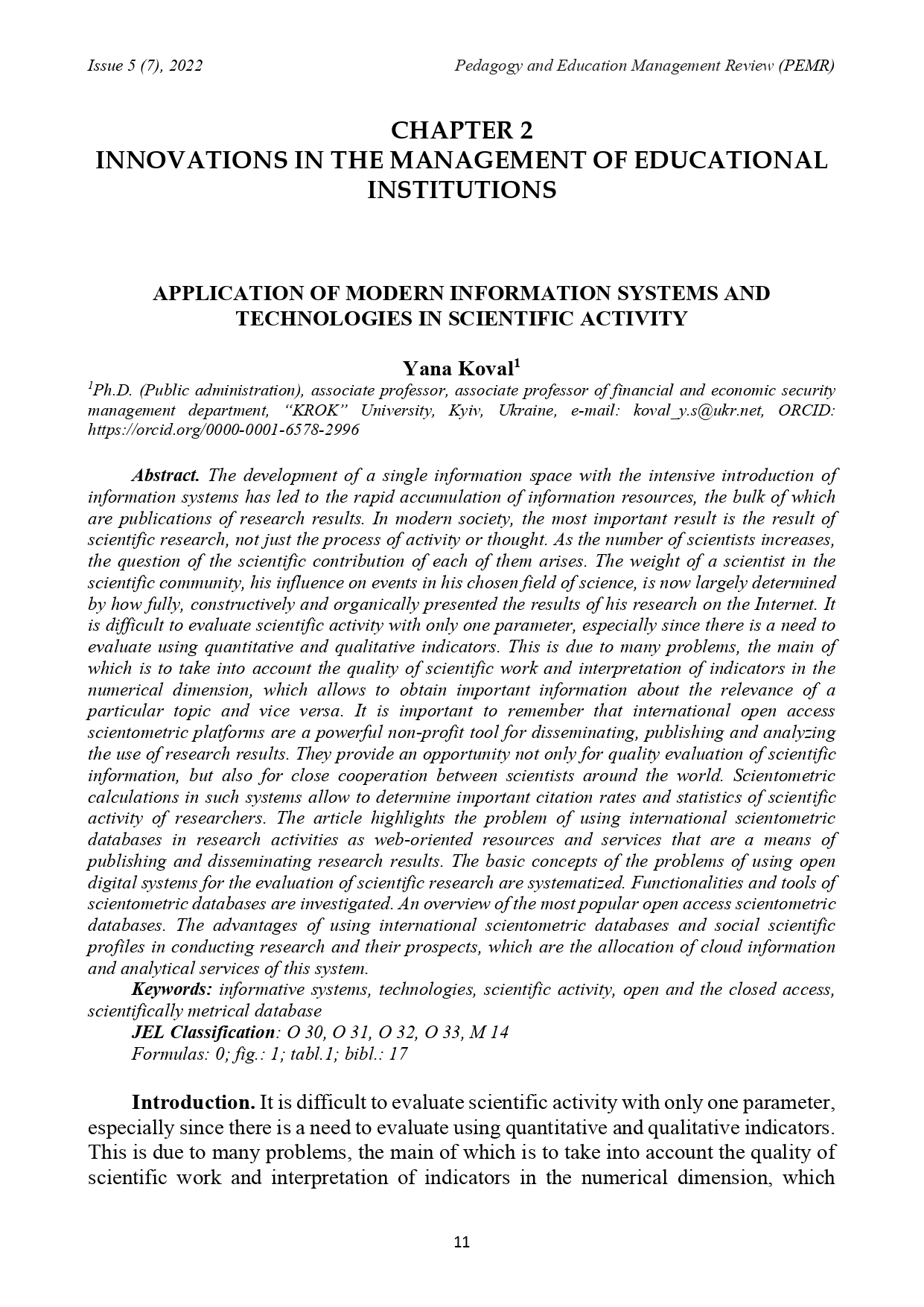Application of modern information systems and technologies in scientific activity
DOI:
https://doi.org/10.36690/2733-2039-2022-5-11Keywords:
informative systems, technologies, scientific activity, open and the closed access, scientifically metrical databaseAbstract
The development of a single information space with the intensive introduction of information systems has led to the rapid accumulation of information resources, the bulk of which are publications of research results. In modern society, the most important result is the result of scientific research, not just the process of activity or thought. As the number of scientists increases, the question of the scientific contribution of each of them arises. The weight of a scientist in the scientific community, his influence on events in his chosen field of science, is now largely determined by how fully, constructively and organically presented the results of his research on the Internet. It is difficult to evaluate scientific activity with only one parameter, especially since there is a need to evaluate using quantitative and qualitative indicators. This is due to many problems, the main of which is to take into account the quality of scientific work and interpretation of indicators in the numerical dimension, which allows to obtain important information about the relevance of a particular topic and vice versa. It is important to remember that international open access scientometric platforms are a powerful non-profit tool for disseminating, publishing and analyzing the use of research results. They provide an opportunity not only for quality evaluation of scientific information, but also for close cooperation between scientists around the world. Scientometric calculations in such systems allow to determine important citation rates and statistics of scientific activity of researchers. The article highlights the problem of using international scientometric databases in research activities as web-oriented resources and services that are a means of publishing and disseminating research results. The basic concepts of the problems of using open digital systems for the evaluation of scientific research are systematized. Functionalities and tools of scientometric databases are investigated. An overview of the most popular open access scientometric databases. The advantages of using international scientometric databases and social scientific profiles in conducting research and their prospects, which are the allocation of cloud information and analytical services of this system.
Downloads
References
Horovyi,V. M. (2015), “Criteria for the quality of research in the context of national interests”, Bulletin of the National Academy of Sciences of Ukraine, № 6, pp. 74–80.
Leydesdorff, L., Wouters, P. and Bornmann, L. (2016), Professional and citizen bibliometrics: complementarities and ambivalences in the development and use of indicators –a state-of-the-art report. Scientometrics. Vol. 109(3), P. 2129-2150.
Hicks, D. Wouters, P. Waltman, L. de Rijcke, S. Rafols, I. (2015), “The Leiden Manifesto for research metrics”, Nature. Vol. 520. P. 429–431. URL: http://www.nature.com/news/bibliometrics-the-leiden-manifesto-for-research-metrics-1.17351/
Lupton, D. (2014), Feeling better connected: Academics’ use of social media. Retrieved from: https://www.canberra.edu.au/about-uc/faculties/artsdesign/attachments2/pdf/nand-mrc/Feeling-Better-Connected-reportfinal.pdf.
Gruzd, A. Haythornthwaite, C. Paulin, D. Gilbert, S. and Esteve del Valle M. (2016), “Uses and gratifications factors for social media use in teaching: іnstructors’ perspectives”, New Media & Society. Vol. 20. Issue 2. P. 475—494. DOI: 10.1177/1461444816662933.
Halevi, G., Moed, H. and Bar-Ilan, J. (2017), “Suitability of Google Scholar as a source of scientific information and as a source of data for scientific evaluation – Review of the Literature”, Journal of Informetrics. Vol. 11(3), P. 823-834.
Waltman, L. (2016), “A review of the literature on citation impact indicators. Journal of informetrics”, Elsevier. Vol. 10. Is. 2. P. 365–391. URL: http://dx.doi.org/10.1016/j.joi.2016.02.007.
Nicholas, D. Rowlands, I. (2011), “Social media use in the research workflow”, Information Services and Use. No 31(1). P. 61—83.
Bornmann, L. Thor, A. Marx, W. and Schier, H. (2016), “The application of bibliometrics to research evaluation in the humanities and social sciences”, Journal of the Association for Information Science and Technology. Retrieved from : https://doi.org/10.1002/asi.23627.
Mihus, I. (2020). Use of scientific profiles to present the results of scientific research of universities. Economics, Finance and Management Review, (3), 89–94. https://doi.org/10.36690/2674-5208-2020-3-89
The official site of Scopus (2022), retrieved from : https://www.scopus.com/home.uri?zone=header&origin=.
The official site of ResearcherID (2022), retrieved from: https://www.researcherid.com/#rid-for-researchers.
The official site of ORCID (2022), retrieved from: https://orcid.org/
The official site of Google Scholar (2022), retrieved from: https://scholar.google.com/.
The official site of ResearchGate (2022), retrieved from: https://www.researchgate.net/.
The official site of Figshare (2022), retrieved from: https://figshare.com/.
The official site of Academia (2022), retrieved from: https://www.academia.edu/.

Downloads
Published
How to Cite
Issue
Section
License
Copyright (c) 2022 “Scientific Center of Innovative Researches” OÜ

This work is licensed under a Creative Commons Attribution-NonCommercial-NoDerivatives 4.0 International License.





